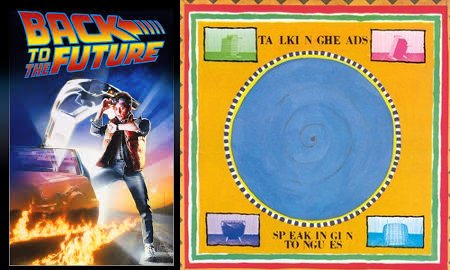Speaking to the Future in Tongues
Most people have heard of the pairing of The Wizard of Oz and Pink Floyd's Dark Side of the Moon album, known as Dark Side of the Rainbow. The band denies having created the album after the movie, and at this point I am undecided.
However, in this post I present a different example where the opposite seems to have been done. A film, Back to the Future (1985) was possibly written, acted, and edited to an album, Talking Head's Speaking in Tongues (1983).
To sync the two, use the same directions as Dark Side of the Rainbow, which starts with the studio's production logo. The album version is the 2006 reissue, which includes 2 bonus tracks. This means that the film would have have to been made with an extra 11 minutes that were then added to the reissue to make it fit. This shouldn't necessarily disprove my theory.
putlocker.rs/watch/back-to-the-future.r07p/yppvmx
youtube.com/watch?v=arisupsq_fU&ytbChannel=happyjessus
The album is played almost exactly twice through. The alternate version of "Burning Down the House" starts at the same time as the ending credits.
I've created a video showcasing some of the interesting timings followed by a shot breakdown.
Shot Breakdown:
0:00 – 0:21
The video begins when the album is repeated at 58:30 of the film. When the song goes full volume with all instruments the doc and Marty have their epiphany about using the school dance.
0:23 – 1:46
This clip shows the beginning of track 2 from the album the first, and then the second time through the film. The first time Marty is blown backward into the couch and the second time his father jumps backward in bed, although 4 bars sooner.
1:51 – 5:30
Track 2 of the album is played into track 3. Marty takes the lead while he is doing various things with his girlfriend. He can be seen responding to various parts of the songs, especially when the guitar parts stand out. In the background at an exercise class the actors are jumping in time. At 4:59 of the video the lyrics talk about a girlfriend as Jennifer’s dad pulls up to give her a ride.
5:33 – 10:46
The rest of track 3 is heard as Biff and George discuss a car wreck. The lyrics repeat, “stop making sense” as George tells Marty that he’s right 2 times. At 7:33 of the video Marty seems to noticeably respond to the synthesizer talking about it the car being important and asking if he has any clue.
As the McFly family sits down for dinner watching tv and conversing the album moves onto track 4 which has a much different tone. It is kind of a spiritual revival song, and the mother describes how she met their father as he watches TV and laughs hysterically.
10:50 – 12:26
Track 4 is played the second time through the album as Marty writes his letter to the doc. The lyrics, “right before your eyes” are sung as Marty says, “shot by terrorists”. It then cuts to the doc talking to a police officer explaining that he’s doing a weather experiment while a strange instrumental solo is played. It then cuts to the dance and the camera pans through the crowd until it gets to George dancing alone in the back.
There is a concept known synchronicity, first introduced by the psychologist, Carl Jung, which identifies “meaningful coincidences” as those with no causal relationship yet seeming to be related. The idea is an important starting point that I'd like to delve into deeper at a later point. It attempts to explain certain paranormal experiences. Purposeful linking could be used for subliminal messaging or concealment, depending on the motives.
Is this just a case of synchronicity and me looking for connections that aren't there?
As closely as this, or any other example, might match, the film's story progresses to preconceived intersections. There are stretches where there seems to be very little connection between the two until they sync up again. “This Must Be the Place” finishes right when Marty arrives to his house in his alternate, better future.
Why would a film use an album to drive its timings and feelings or vice versa? It is a sort of challenge to start with a great piece of art and attempt to create something new from it that both stands apart, but also enhances the original.
Is it a cheaper form of content generation to take a work and apply some sort of systematic reduction to it. As an artist, why start from scratch ever? There are surely recognizable patterns that can be identified in countless other works.
An interesting side note to think about in this vein is the way that art styles develop and progress. The time frame can vary drastically. When we think of modern music we group it by decade. Film has, relatively, a much longer life in terms of style, at least double and possibly three times or longer than that of music.
I, of course, encourage everyone to watch and listen to this film album pairing in full as they are both classics. I hope to generate some good discussion. This is just an introduction post and I have much more to say on this topic. The feedback I get will determine what direction to go with it.

@bsherrill
Nice writeup
Good job
Keep it up.